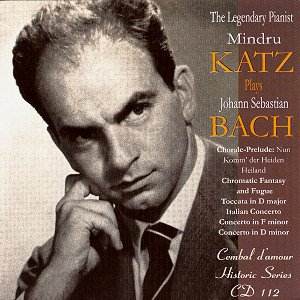During the course of a long, noisy and strenuous recording
session of the Prokofiev First Piano Concerto and the Khachaturian,
the conductor, Adrian Boult, became aware that amid the tumult the soloist
was playing Bach. He quietened the orchestra and together they listened
until the end. "I’d no idea he had it in him" Boult later
wrote to a friend in a backhanded compliment. It was the winter of 1958
and the soloist was Mindru Katz, born in Bucharest in 1925 and who died
on stage in concert in Istanbul fifty-three years later. What Boult
meant was that Katz’s reputation as a bravura thirty-three year old
purveyor of the brash and athletic powerhouse concertos had gone before
him. As was proved to be the case in Katz’s recording of Beethoven’s
Emperor Concerto with Barbirolli this was very far from being the case.
And now here is his Bach, retrieved by Katz pupil Mordecai
Shehori of Cembal d’Amour. It is strong, resilient, Romantic and persuasive.
The hyphenated Bach-Busoni with which the recital begins – the Chorale
Prelude Nun Komm’ der Heiden Heiland - has a slow, veiled, velvet
sonority that is both reverential and sustained. In the Chromatic Fantasy
and Fugue there is a strong sense of legato, of romanticised freedoms
being enjoyed within the formal constraint. His glittering treble and
right hand runs impart a sense of animation and depth and the free use
he makes of the pedal convey a real sense of grandeur and power. The
Toccata in D major has abrupt, almost contrastive playing and phrasing
– with extreme of diminuendo in the interests of internal drama. If
one responds negatively to some of this Katz is never egocentric, this
is playing of conviction borne of romantic affiliation. The Italian
Concerto goes quite well; a stately Allegro, with clarity of voice parts
brought out, and distinctly reduced dynamics in the Andante; not the
most cavalier of performances or one most guaranteed to bring the house
down but reasonable on its own terms.
The two orchestral concertos feature the Pro Arte Orchestra
conducted by the able Harry Newstone. Maybe the strings are a little
undernourished here and there but they still supply enthusiastic support
to a soloist who takes the Largo of BWV 1056, the F minor, quite slowly
and whilst one can defend the tempo and intent the execution – orchestral
pizzicati - is rather drip-drop. By contrast I enjoyed the buoyancy
of the Allegro of the D minor and the philosophic sternness of its Adagio,
realised well by Katz who releases us into the light of the Allegro
finale with generosity and affection.
Disappointing recording details are pretty much the
only thing that mars this reissue and at just under 80 minutes it is
itself conspicuously generous time-wise. Boult was right to quieten
the LPO because Katz’s Bach is the mark of a musician of stature.
Jonathan Woolf


